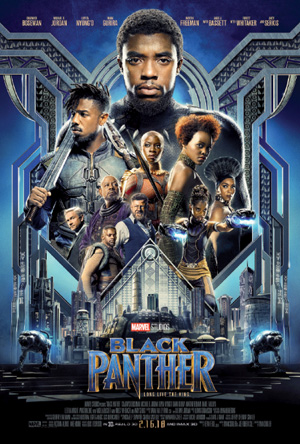Posted on Feb 27, 2018 in
MOVIES
FAMILY NIGHT AT THE MOVIE | By Christopher Hill –
 The story of Black Panther is quite complex. In advance of the films release, there was a lot of buzz about it being a touchstone film—a movie about more than what is on the screen. To do any review justice, Black Panther must be looked at through two prisms. The first is to view the film’s place in the genre, the more traditional review. The second is to look at this movie and its potential cultural significance.
The story of Black Panther is quite complex. In advance of the films release, there was a lot of buzz about it being a touchstone film—a movie about more than what is on the screen. To do any review justice, Black Panther must be looked at through two prisms. The first is to view the film’s place in the genre, the more traditional review. The second is to look at this movie and its potential cultural significance.
The fact that any superhero movie can take on cultural significance, not just a place in the pop culture lexicon, is a testament to how far comic book movies have come. Black Panther is one of the first superhero films to star an African American character. In the past, there have been films featuring black superhero-like characters, but for the big two (DC and Marvel), it has been a rare happening. Early in their cinematic endeavors, Marvel developed Blade into a trilogy. In fact, it was their first commercial success. DC has tentatively set a solo Cyborg adventure for a 2020 release.
Last year’s Wonder Woman feature empowered an entire gender. The pre-release buzz on Black Panther fueled similar responses, with African American entrepreneurs and community activists purchasing screenings for underprivileged youth to ensure they will see this film.
But is that trust in Marvel’s ability to deliver a poignant, racially inspiring film warranted?
Black Panther, at its core, is both an origin and a coming-of-age film. The Black Panther, T’Challa (Chadwick Boseman) was first introduced to audiences during Captain America: Civil War, during which his father, the leader of a small and secretive African nation known as Wakanda, was killed and T’Challa was set to replace him as king. With a murky timeline from the previous Captain America film, Black Panther is the continuation of T’Challa’s evolution to the role of king. Through these steps to his coronation, we meet his scene-stealing sister Shuri (Letitia Wright), his mother Ramonda (Angela Bassett), his mentor Zuri (Forest Whitaker) and a host of tribal leaders, all ready to celebrate the new king.
Outside of Wakanda, the only man that knew the secrets behind the country, Ulysses Claw (Andy Serkis), is planning another score of vibranium, the top-secret, strongest metal on earth. He partners with a bloodthirsty terrorist named Erik Killmonger (Michael B. Jordan) who has more in mind than just a heist. Through it all, T’Challa must prove his worth as a leader through challenges and the knowledge he has gained, showing him how heavy is the head that wears the crown.
Director Ryan Coogler has painted a world in dimensions of both tribal traditionalism and 24th century technology. The blending of the two is masterful. Scenes feel authentic to the tribal past of Wakanda, while in the same sequence, we see how their technology merges directly with their surroundings. As a world-building film, thrusting Wakanda to the Marvel Cinematic Universe forefront, the esthetics on screen are a delight. You see their world and want to be a part of it.
The story itself is reminiscent of many of the Marvel origin stories, where each needs to master their domain before proving their worth. Tony Stark needed to come to terms with the reasons behind his fortune. Steven Strange had to find meaning beyond his impairment. T’Challa must prove that he is ready to assume the role of king and with that, the future of all he leads.
In 1989, Spike Lee debuted Do the Right Thing. It became a transcendent film describing a day in the life of an African American community. Black Panther is not a transcendent film in the like of Spike Lee’s masterpiece. And it doesn’t need to be. Nearly the entire cast of Black Panther is African American, and at no point do you wonder about the steps of progress they make. Instead, you are immersed in a world about good people you grow to care about and bad people you want to see stopped.
To make progress, you don’t always need to highlight differences. Black Panther reminds us of the ties that bind us together: the need to prove ourselves to our elders, our innate desire to do good works, and the love of family. And it does all this without shining a spotlight on skin pigmentation.
And that is progress.
Black Panther
Now Showing: In Theaters Now
Rated: PG-13
Violence: Yes, mostly comic book sequences with lots of fights, but there is one scene that shows blood.
Language: Minor and infrequent
Sexuality: None
©Marvel Studios 2018



 <
<





 The story of Black Panther is quite complex. In advance of the films release, there was a lot of buzz about it being a touchstone film—a movie about more than what is on the screen. To do any review justice, Black Panther must be looked at through two prisms. The first is to view the film’s place in the genre, the more traditional review. The second is to look at this movie and its potential cultural significance.
The story of Black Panther is quite complex. In advance of the films release, there was a lot of buzz about it being a touchstone film—a movie about more than what is on the screen. To do any review justice, Black Panther must be looked at through two prisms. The first is to view the film’s place in the genre, the more traditional review. The second is to look at this movie and its potential cultural significance.